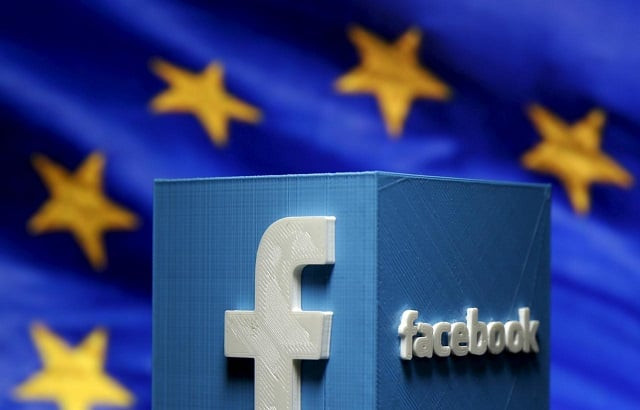Journalists urge EU to resist lobbying by tech giants
To gut a law which would force them to pay for the news content they pick up

A 3D-printed Facebook logo is seen in front of the logo of the European Union in this picture illustration made in Zenica, Bosnia and Herzegovina on May 15, 2015.
PHOTO: REUTERS
European Parliament lawmakers voted in September to compel Google, Facebook and other major tech firms to pay a form of copyright for media stories they use.
The historic decision was hailed by media organisations who claimed they were fleeced for years by search engines and aggregators not paying for their work.
The so-called copyright and neighbouring rights' law aims to ensure that producer of content -- whether news, music or movies -- are paid fairly in a digital world.
Children drowning in ‘digital diet of pizza and sweets’
But a group of 100 leading journalists warned Tuesday that intense lobbying by so-called Big Tech on the law, which also has to be agreed by the Council of Ministers and the European Commission, is "emptying the text of substance".
Major publishers, including AFP, have pushed for the reform -- known as Article 11 -- seeing it as an urgent remedy to safeguard quality journalism and the plummeting earnings of traditional media companies.
But opponents have called it a "link tax" that will stifle discourse on the Internet.
"Think of the investigative work that goes into publishing the headline 'Suicide attack in Baghdad Shiite quarter: 32 dead, say police, hospitals,'" said AFP Middle East correspondent Sammy Ketz, in an open letter to the EU supported by leading reporters worldwide.
"To pen this simple line, the journalist has questioned the police to determine what kind of explosion took place, called the hospitals to establish a casualty toll, visited the scene of the blast for a description and to interview witnesses.
"Occasionally he may risk his life because it is not unusual for a secondary attack to happen... This was the case in Kabul recently when nine journalists and photographers lost their lives, including AFP's Shah Marai," he said.
Yet lobbyists were trying to "exclude references to 'factual' and 'snippets' to exclude press agencies and specialist media, and to reduce the protection period for neighbouring rights," Ketz said.
But it was precisely these short stories which are "read in huge quantities... that generate millions of online interactions and thus considerable revenue for the platforms," he argued.
Internet giants, who are widely accused of helping spread fake news, were bent on making it impossible for journalists to do their job verifying facts, Ketz insisted.
"In the end, the field will be left to those who peddle fake news," the news veteran added.
"Excluding short extracts from neighbouring rights will lead publishers and news agencies to employ fewer journalists, to shut their bureaus in Afghanistan, Iraq, Iran, North Korea" and elsewhere, he said.
Tech firms should be made liable for ‘fake news’ on sites
"Then what will be the sources of information? State media? The disinformation campaigns run by authoritarian regimes?
"Let's not allow 'bots' and 'troll farms' to take over from reporters, or leave online fiction to replace verified fact," Ketz said.
But resistance to the law has been fierce from tech giants, especially to Article 13: the proposal to make online platforms legally liable for copyrighted material put on the web by users.
They say this will restrict creativity and the usage of memes and remixes by everyday net users.
But the journalists have rejected this as a "lie".
"Free access to the web will endure because the internet giants, which now use editorial content for free" can well afford to reimburse the media without asking consumers to pay, they said in a previous open letter to lawmakers.



















COMMENTS
Comments are moderated and generally will be posted if they are on-topic and not abusive.
For more information, please see our Comments FAQ